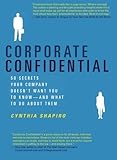This gets posted from time to time, but if you work for a company, you really owe it to yourself to read Corporate Confidential.
https://www.amazon.com/Corporate-Confidential-Secrets-Compan...
https://www.amazon.com/Corporate-Confidential-Secrets-Compan...
Similarly, your manager's boss is much more likely to side with your manager than with you. And complaining to your own manager may backfire if he values toxic-guy more than you (which seems to be the case).
So I'd suggest that if it really bothers you, start looking for a new job. Otherwise, ignore it. If your manager is already talking to him about his behavior, he might eventually improve his attitude.
For more on HR's role in a company, you might want to read this book (which I read after it was recommended a while back by someone else on HN):
Corporate Confidential: 50 Secrets Your Company Doesn't Want You to Know---and What to Do About Them
By Cynthia Shapiro
Whole book is highly depressing, but very useful if you want to try to climb up the ladder.
[1] http://www.amazon.com/Corporate-Confidential-Secrets-Company...
Also, some laws that protect collective employee activities like union organizing or discussing salaries may not apply to people who have managerial titles.
Talking to an employment lawyer is a very good idea, since you may be getting fired in retaliation for reporting illegal activity: "the 'expert' turned out to be producing documents that are not in compliance with Federal law." You might have a case for a wrongful dismissal lawsuit, which could give you leverage to get a hefty severance payment to make the case (and adverse publicity) go away by settling out of court. So definitely consult a good lawyer who practices employment law in your state.
"2. Document everything... 3. Save proof of the violations."
Needless to say, don't save these on your company computer, since the moment they decide to fire you you'll lose access to it.
"1. Do not talk to anyone else in the company about this issue. Do not trust HR or legal."
For more information on the role of HR and why they shouldn't be trusted, read the book Corporate Confidential by Cynthia Shapiro (which I learned about from a comment on HN a while back; thanks to whoever posted that!).
Link to book: http://www.amazon.com/dp/0312337361
Obviously other people can influence your (bigger, life-long) career, but as far as one company goes, this is the truth.
This concept is explored wonderfully in "Corporate Confidential: 50 Secrets Your Company Doesn't Want You to Know".
http://www.amazon.com/Corporate-Confidential-Secrets-Company...
http://www.amazon.com/Corporate-Confidential-Secrets-Company...
A few takeaways.
1. Performance improvement plans are not for performance improvement. They are for firing employees. Management already formed an irreversible negative view. It is too late.
2. You cannot win a case against the company. Because a) companies have more resources and b) even if you do win then other companies will mark you as a troublemaker. Getting hired is going to get a lot harder.
3. If you insist on fighting then do document everything. Supposedly you need a few months of notes. In other words, being called a slur once or twice does not make a hostile work environment. If HR is unaware then the company is not liable, but if you share your notes then you won't win the case anyway. There are a few narrow forms of discrimination that are claimable but the best option is to keep your head down and find a new job.
4. Do not document anything on company software or networks. My friend got to learn what Data Loss prevention software really did.
5. HR has zero legal obligation to keep your secrets. Their job is to identify threats to the company. They literally get paid to share your secrets.
Bonus anectode: I went to HR and asked "Are you legally required to keep things I tell you confidential? For example, if I tell you I want to leave then will you tell my boss?"
Her answer to my second question was no, but guess what my boss and I talked about the next day!


The main function of HR is not to serve employees. The main function of HR is to protect the employer from legal liabilities.
[0] https://www.amazon.com/Corporate-Confidential-Secrets-Compan...